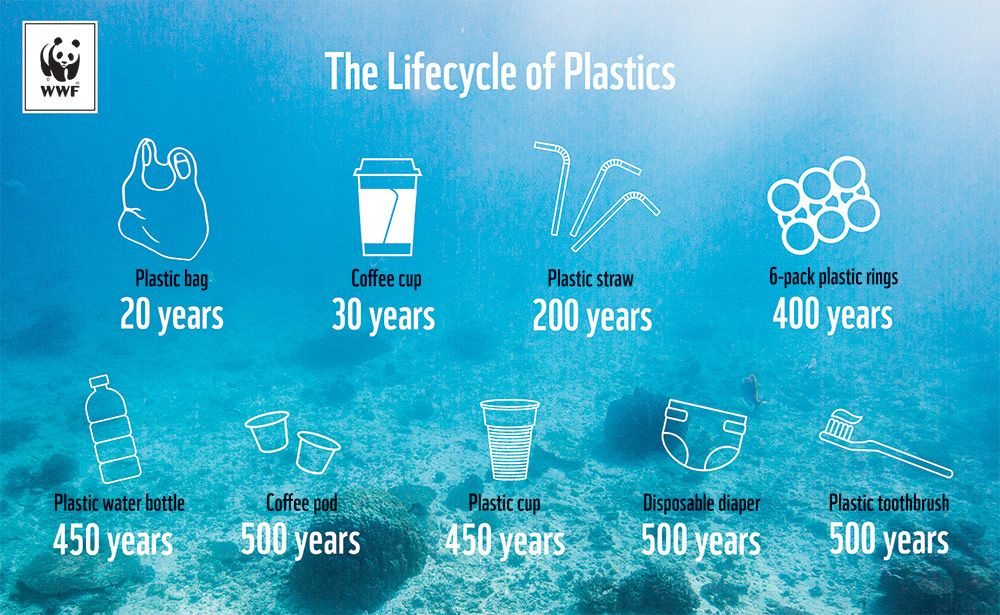Sustainability: Materials that could help us save the Earth

Sustainability: Materials that could help us save the Earth
In the 21st century humanity faces a lot of challenges from overpopulation, finding ways for sustainable energy, to finding new ways to store our products that do not involve the use of plastic products.
Why is plastic such a problem?
Modern society is overflowing with the number of uses, where plastic is being used. It is estimated that one million plastic bottles are purchased every minute (see link below).[1]
Single use plastics started to pick up pace in the 1990s, where such waste had tripled. I personally remember as a kid growing up in Bulgaria that there were almost no plastic products in my early childhood years. However, that level started to increase dramatically as I got older. Nowadays it is hard to avoid the level of plastic in our everyday life. Plastic is being used to package everything from bananas, to TVs, bread, furniture, shipping boxes etc.
The main problem started in the early 2000s, where plastic had increased more in a single decade when compared to the last 40 years. It is estimated that 300 million tones of plastic are produced every year.
Please check the UNEP link below as it gives a great introduction to the problem:
https://www.unep.org/interactive/beat-plastic-pollution/
How long can plastic remain in the environment?
That depends on the type of plastic and its’ chemical composition. Some can last decades, whilst others can last hundreds of years. This image taken from the WWF website provides a very interesting overview.[2]
Imagine a simple plastic toothbrush could take up to 500 years! That is because it is made up of multiple layers of plastic along with the nylon brushes, which make it a very difficult item to recycle. Currently, there is an initiative in the UK to reduce the pollution of such products and there are special collection areas for such products. On the Terracycle website you can see that anything from mouthwashes, toothbrushes, to tubes can be collected and handled in a sustainable way: https://www.terracycle.com/en-GB/brigades/colgate-uk
What can we do?
In recent years there have been many initiatives to address this issue. Companies are waking up to the fact that their production processes and the materials they put into their products could have lasting consequences, sometimes in the decades.
One approach is where companies are trying to create more effective packaging materials that are easily recyclable.
A good alternative that has been pointed is the use of bamboo. Bamboo grows very fast, is cheap to produce and is very adaptable.[3] The real benefit is that it does not need fertilizers, is extremely resilient to pests, and can be grown in a variety of regions.[4] Bamboo can be crafted into toothbrushes, baskets, straws, cutlery, and many other materials as an example.
Another interesting material is nanocellulose as seen here: https://norwegianscitechnews.com/2017/11/super-material-can-replace-plastic/
Also another good example are silicone food bags that can be used for cooking; or what about reusable food wraps; metal straws and many other items could already have sustainable and eco-friendly alternatives. The only downside is that they could be a bit more expensive when compared to their plastic counterparts.[5]
There are also many other interesting options as listed on this website: https://www.bbc.com/future/article/20190125-the-natural-products-that-could-replace-plastic
Furhtermore, you can read up on how various countries are dealing with their plastic issue:https://www.rd.com/list/ways-other-countries-are-replacing-plastic/
In conclusion
Dealing with plastic products and its’ by-products is going to be a real challenge as our planet has reached a critical point and this needs to be address immediately. Both governments and societies need to adapt and change to protect our environment, wildlife and future generations, so that we can live in a more sustainable and brigher future.
References(no an exhaustive list):
https://www.terracycle.com/en-GB/brigades/colgate-uk
https://www.fswaste.co.uk/2021/03/can-you-recycle-toothbrushes-toothpaste/
https://www.savemoneycutcarbon.com/learn-save/how-long-does-it-take-for-plastic-to-biodegrade/
https://www.wwf.org.au/news/blogs/the-lifecycle-of-plastics
https://www.sas.org.uk/our-work/plastic-pollution/plastic-pollution-facts-figures/
https://ourworldindata.org/plastic-pollution
https://www.unep.org/interactive/beat-plastic-pollution/
https://ecobravo.co.uk/blogs/blog/can-bamboo-replace-single-use-plastic-products
https://www.globalcitizen.org/en/content/plastic-alternatives-doing-harm/
https://www.bbc.com/future/article/20190125-the-natural-products-that-could-replace-plastic
https://norwegianscitechnews.com/2017/11/super-material-can-replace-plastic/
https://www.rd.com/list/ways-other-countries-are-replacing-plastic/
https://www.cullen.co.uk/moulded-pulp/replace-plastic-packaging/
https://www.westerntelegraph.co.uk/news/18983159.amazon-replace-plastic-order-paper/
[1] https://www.unep.org/interactive/beat-plastic-pollution/
https://unsplash.com/photos/ywVgG0lDbOk?utm_source=unsplash&utm_medium=referral&utm_content=creditShareLink